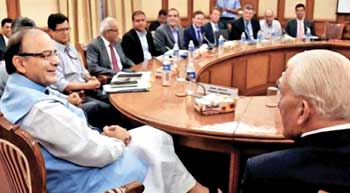All states will implement GST by July 2017. The Constitution Amendment Bill for Goods and Services Tax has been approved by the President of India post its approval in Parliament (Rajya Sabha on 3 August 2016 and Lok Sabha on 8 August 2016) and ratification by more than 50 per cent of state legislatures.
FlashNews:
India Is Advancing Growth While Preserving Heritage: Sonowal
ISA and IIT Delhi Partner to Build Global Solar Skills
Solar Service Searches Surge 43% Nationwide, Justdial Data Shows
Centre Clears ₹7.97 Billion Green Hydrogen Jetty at Paradip Port
ONGC Hosts 7th Para Games, Championing Inclusion in India Inc.
India’s Space Sector Secures Cyber Shield with CERT‑In, SIA‑India Guidelines
GAIL Breaks Ground on Sohna R&D Centre to Drive Clean Energy Innovation
Veolia Secures 2 Landmark Mumbai Water Projects to Boost Urban Sustainability
Emirates SkyCargo Expands India Freighter Network to Meet Rising Trade Demand
Colliers Maps 30 Industrial & Warehousing Growth Hubs Across India
PAIMANA Portal Tracks ₹39 Trillion Infrastructure Projects in January 2026
Tata Power-Warwick Alliance to Accelerate Energy Systems Innovation
India’s Space Kidz Launches World’s First Space Curriculum for Schools
Road Awards Slowdown to Hit Execution, Intensify Bidding: ICRA
Clean Energy Transition: India’s Global Leadership
Dual Airports to Handle 40 Million Passengers in 2026, Timely Ramp‑Up Crucial: Crisil Ratings
Kazipet Coach Factory Ready for Commissioning as RVNL Completes Core Works
Suzlon Reshapes Leadership: J P Chalasani Elevated, Ajay Kapur Named Group CEO
Noida International Airport Partners Mann Fleet for Seamless Ground Mobility
Tag: SGST
GST implementation will ensure seamless credit availability
The most crucial tax reform since Independence, GST aims to iron out a multilayered indirect tax system and usher in a uniform tax structure. This development augurs well for the infrastructure sector.
GST… What´s in it for infra?
India´s ambitious infrastructure development plans hinge largely upon a successful transition from the current multiple taxes regime to the new uniform taxation code of the Goods and Services Tax (GST). Is the industry ready to meet the April 1, 2017 deadline? We do a status check...
Most complex tax regime by far
The macroeconomic aspects of GST haven´t been taken into account. If the government says that it will collect more revenue, then that means that prices will have to rise because it´s an indirect tax. If prices rise, then industrial output would tend to stagnate or decline.





